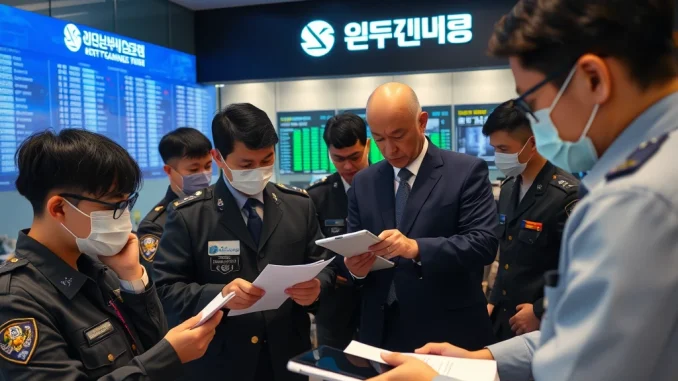
Is your crypto exchange playing by the rules? In the ever-evolving world of digital currencies, regulatory oversight is becoming increasingly crucial. South Korea, a major player in the crypto market, is stepping up its game. The Financial Intelligence Unit (FIU) in South Korea has initiated a critical inspection of Coinone, one of the country’s prominent crypto exchanges. This move signals a heightened focus on compliance and security within the virtual asset space. Let’s dive into what this inspection means for Coinone and the broader crypto landscape in South Korea.
Why is South Korea’s FIU Inspecting Coinone?
The FIU inspection of Coinone isn’t out of the blue. It’s a direct follow-up to Coinone’s application for renewal as a virtual asset service provider (VASP), submitted in October 2024. Think of it as a thorough check-up before giving a clean bill of health. The primary goal of this on-site inspection, conducted by the South Korean regulator, is to meticulously assess whether Coinone is adhering to the stringent anti-money laundering (AML) obligations mandated by South Korea’s financial transaction reporting law.
Here’s a breakdown of what the FIU will be looking at:
- AML Compliance Framework: Does Coinone have robust systems and procedures in place to detect, prevent, and report suspicious transactions?
- Customer Due Diligence (CDD): Is Coinone effectively verifying the identities of its customers and monitoring their transactions?
- Transaction Monitoring: Does the exchange have sophisticated tools to flag and investigate potentially illicit activities?
- Reporting Mechanisms: Is Coinone properly reporting suspicious activity reports (SARs) to the FIU?
- Record Keeping: Are records of transactions and customer data maintained accurately and securely?
What are AML Obligations for Crypto Exchanges Like Coinone?
Anti-money laundering (AML) obligations are the backbone of a secure and trustworthy financial system, and they are just as vital for the burgeoning crypto exchange industry. For platforms like Coinone operating in South Korea, these obligations are not just suggestions; they are legal requirements designed to prevent the misuse of crypto for illegal activities such as terrorism financing, drug trafficking, and other financial crimes.
Let’s break down the key AML obligations:
| AML Obligation | Description | Why it Matters |
|---|---|---|
| Customer Due Diligence (CDD) | Verifying customer identities through KYC (Know Your Customer) procedures. | Prevents anonymous accounts from being used for illicit activities. |
| Transaction Monitoring | Continuously monitoring transactions for suspicious patterns or anomalies. | Detects and flags potentially illegal transactions in real-time. |
| Suspicious Activity Reporting (SAR) | Reporting any identified suspicious transactions to the FIU. | Ensures authorities are informed about potential money laundering activities. |
| Record Keeping | Maintaining detailed records of transactions and customer information. | Provides an audit trail for investigations and compliance checks. |
| Compliance Officer Appointment | Designating a responsible officer to oversee AML compliance. | Ensures accountability and focused management of AML efforts. |
Coinone Under Scrutiny: What’s at Stake?
For Coinone, the stakes are high. A successful FIU inspection means smooth sailing towards VASP renewal and continued operation in the competitive South Korean crypto market. However, if the inspection reveals significant shortcomings in AML compliance, Coinone could face:
- Delays in VASP Renewal: Approval could be postponed until deficiencies are rectified, impacting business continuity.
- Fines and Penalties: Non-compliance can lead to substantial financial penalties imposed by the FIU.
- Reputational Damage: Negative findings could erode public trust and confidence in Coinone, affecting user acquisition and retention.
- Operational Restrictions: In severe cases, regulatory actions might include limitations on operations or even suspension of services.
This inspection serves as a crucial moment for Coinone to demonstrate its commitment to regulatory compliance and secure operations. It’s also a broader signal to the entire crypto exchange industry in South Korea that regulators are serious about enforcing AML standards.
Broader Implications for the South Korean Crypto Market
The Coinone FIU inspection is not an isolated event. It’s part of a larger trend of increased regulatory scrutiny in the South Korean crypto market. As the digital asset space matures, governments worldwide are focusing on establishing clear regulatory frameworks to balance innovation with investor protection and financial stability. South Korea is no exception, and this on-site inspection underscores its proactive approach.
Here’s what this means for the South Korean crypto market:
- Increased Regulatory Clarity: Actions like these inspections help clarify the regulatory expectations for crypto businesses.
- Enhanced Investor Protection: Stronger AML compliance translates to a safer environment for crypto investors.
- Market Consolidation: Exchanges that prioritize compliance and security are more likely to thrive, potentially leading to market consolidation.
- Global Standards Alignment: South Korea’s regulatory efforts contribute to the global movement towards standardized crypto regulations.
The Path Forward for Coinone and Crypto Regulation
As Coinone undergoes this rigorous inspection, the outcome will be closely watched by industry players and regulators alike. For Coinone, it’s an opportunity to showcase its dedication to compliance and solidify its position as a trusted crypto exchange. For the South Korean crypto market, it’s a reminder that robust regulatory oversight is essential for sustainable growth and mainstream adoption.
The FIU inspection of Coinone is a powerful example of how regulators are taking a proactive stance to ensure the integrity of the digital asset ecosystem. By prioritizing AML compliance, South Korea is aiming to create a safer, more transparent, and ultimately more sustainable crypto market for the future. This vigilant approach is crucial for fostering trust and confidence in the burgeoning world of cryptocurrencies.



